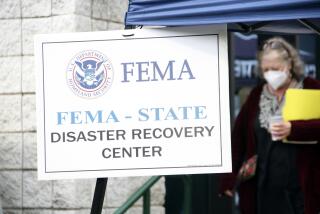FBI Makes Moves to Signal Impatience With ‘Freemen’
- Share via
SEATTLE — Signaling a growing impatience over a 2-month-old standoff with the Montana “freemen,” the FBI said Friday that it was moving three emergency rescue vehicles and a helicopter to a staging area near the anti-government activists’ remote wheat farm.
The statement, the lengthiest since federal law enforcement descended onto the Montana plains on March 25, signaled a potential escalation of the standoff at a time when nearly all negotiation avenues have been closed off.
The armored vehicles are defensive in nature and are needed “in the event it becomes necessary” to conduct emergency rescues and to occupy portions of the freemen ranch in the vast wheat fields and grass ranges of northwestern Montana outside of Jordan, the FBI said.
“Despite the best efforts of the FBI and third-party intermediaries, the freemen have terminated all efforts at negotiations,” the bureau said in a statement released in Washington, D.C.
The FBI said it “still hopes there can be a peaceful, negotiated resolution without jeopardizing the safety of law enforcement personnel or others,” and officials emphasized that the agency will continue to urge the freemen to negotiate an end to the standoff.
“At the same time,” the statement said, “the FBI intends to keep open all lawful options.”
There were no signs that law enforcement officials planned immediately to move the rescue vehicles from the staging area, 35 miles away at the county fairgrounds in Jordan, to the FBI checkpoint outside the ranch.
However, law enforcement officials already have moved in three generators to the area to make it possible to cut off power to the ranch and still maintain service to surrounding properties. The freemen are believed to have their own generator and a limited supply of fuel.
The 68-day-old standoff already has dragged on longer than the FBI’s 51-day siege at the Branch Davidian compound near Waco, Texas, in 1993 and has proved a difficult trial for the agency’s attempt to place negotiation ahead of strong-arm tactics in dealings with anti-government groups.
A total of 18 people, including three children, remain holed up on the ranch of freemen activist Ralph Clark. Half a dozen of them are believed to be hard-core adherents to the freemen’s rigid anti-government philosophy, which does not recognize the authority of most government institutions and embraces the idea that God has established an impenetrable barrier around the freemen compound. Most others are sympathizers and fugitives on a variety of other charges from across the country.
The standoff began when undercover agents lured freemen leaders LeRoy Schweitzer and Daniel Peterson out of the ranch and arrested them on a federal indictment alleging that the freemen’s declaration of their own monetary system and issuance of millions of dollars in fake money orders amounted to interstate fraud.
In its statement Friday, the FBI revealed that it has used 42 intermediaries, ranging from right-wing sympathizers to religious experts, in an effort to resolve the standoff without bloodshed.
Some of those most critical of the government’s actions at Waco and at Ruby Ridge, Idaho--where the siege of separatist Randy Weaver led to the death of Weaver’s wife, son and a federal agent--have condemned the freemen for refusing to negotiate and applauded the FBI’s patience.
Former Army Col. James “Bo” Gritz, who helped bring an end to the Weaver standoff, left the freemen compound after several days of fruitless talks and advised the FBI to move in to arrest them without bloodshed. Likewise, Colorado state Sen. Charles Duke, a legislator well-known in patriot circles, abandoned several days of talks after an argument with the freemen leaders.
The FBI statement clearly appeared to lay the groundwork to an escalation of the standoff, although when and at what level remained uncertain. FBI officials refused to elaborate.
More to Read
Sign up for Essential California
The most important California stories and recommendations in your inbox every morning.
You may occasionally receive promotional content from the Los Angeles Times.












